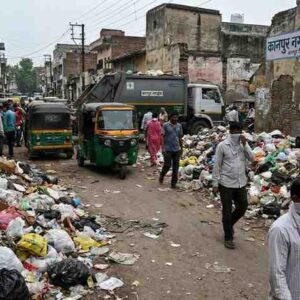Introduction
Sustainable growth has become a cornerstone of Uttar Pradesh’s development agenda as the state seeks to balance economic expansion with environmental preservation and social equity. With its ambitious goal of becoming a$1 trillion economy, UP is implementing policies that not only boost industrial growth but also emphasize renewable energy, green infrastructure, and inclusive progress. This article examines how government policies in UP are adapting to ensure sustainable growth and long-term resilience.
Key Policies Driving Sustainable Growth
1. Renewable Energy Initiatives
Uttar Pradesh is leveraging its geographical advantages to become a leader in renewable energy.
- Key Targets:
- Achieving10 GW of solar capacityby 2030.
- Promoting off-grid solar systems and rooftop installations to enhance energy access in rural areas.
- Key Policy:
- Uttar Pradesh Solar Energy Policy 2017:
- Offers subsidies for solar projects and incentivizes private sector participation.
- Uttar Pradesh Solar Energy Policy 2017:
- Example:
- Solar parks in Bundelkhand and rooftop solar projects in urban areas have collectively added over1.5 GW of capacityin recent years.
(Source:MNRE)
2. Green Infrastructure Development
Infrastructure projects in UP are being designed with sustainability at their core.
- Flagship Projects:
- Purvanchal Expressway:Equipped with solar lighting and eco-friendly designs.
- Jewar International Airport:Adopting energy-efficient technologies and sustainable construction practices to minimize its carbon footprint.
(Source:UPExpresswaysIndustrialDevelopmentAuthority)
3. Promoting Sustainable Agriculture
Agriculture, a key pillar of UP’s economy, is undergoing a green revolution with policies emphasizing sustainable practices.
- Initiatives:
- Soil Health Management Scheme:Aims to reduce chemical fertilizers and promote organic farming.
- Drip Irrigation Subsidies:Encourage water-efficient irrigation techniques.
- Example:
- The use of precision farming technologies and bio-fertilizers has significantly improved productivity in sugarcane and wheat cultivation.
(Source:UPAgricultureDepartment)
4. Urban Sustainability and Smart Cities
With rapid urbanization, UP’s policies are focused on creating smart, sustainable cities that balance growth with quality of life.
- Key Program:
- Smart Cities Mission:Varanasi, Kanpur, and Lucknow are adopting green mobility solutions, waste management systems, and digital governance for efficient resource use.
(Source:SmartCitiesMission)
- Example:
- Kanpur’s transition to electric buses has reduced urban pollution and improved public transport efficiency.
5. Waste Management and Circular Economy
The state is adopting waste management practices to reduce landfill dependency and promote recycling.
- Key Initiatives:
- Swachh Bharat Abhiyan:Focuses on waste segregation and solid waste management in urban and rural areas.
- Pilot projects for converting organic waste into bioenergy are being implemented in cities like Lucknow.
Achievements in Sustainable Growth
1. Renewable Energy Milestones
- Over1.5 GW of solar capacityinstalled, contributing significantly to India’s renewable energy targets.
2. Improved Urban Living Standards
- Smart Cities initiatives in Varanasi and Lucknow have improved waste management and introduced green public transport.
3. Boost in Organic Farming
- The area under organic farming has doubled in the last five years, driven by state incentives and awareness campaigns.
(Source:UPAgricultureReport 2023)
Challenges in Achieving Sustainability
1. Funding and Investments
Despite progress, green projects require significant funding, and attracting private investment remains a challenge.
2. Regional Disparities
While urban areas like Lucknow and Noida are progressing rapidly, rural regions such as Bundelkhand lag in adopting sustainable practices.
3. Workforce Skill Gaps
Sustainability projects often require specialized skills, which are lacking in many sectors.
Strategies to Overcome Challenges
1. Strengthening Public-Private Partnerships (PPPs)
Collaborations between the government and private players can bridge funding gaps and bring technical expertise to green projects.
2. Focused Rural Interventions
Targeted investments in rural areas can promote sustainable agriculture and renewable energy adoption.
3. Expanding Digital Infrastructure
Digital platforms can enhance awareness and adoption of sustainable practices across sectors.
4. Promoting Green Entrepreneurship
Incentivizing startups and MSMEs in renewable energy and waste management can boost innovation and job creation.
Opinionated Yet Balanced Perspective
Uttar Pradesh’s evolving policies reflect a strong commitment to sustainable growth, with commendable achievements in renewable energy, green infrastructure, and waste management. However, the state must address challenges like regional disparities and funding gaps to ensure inclusive and balanced progress. Strategic collaborations and localized interventions will be critical to sustaining momentum.
Conclusion
Uttar Pradesh’s focus on sustainability showcases a forward-thinking approach to development. By integrating green policies into its growth agenda, the state is setting a benchmark for eco-friendly and inclusive progress. With sustained efforts and adaptive strategies, UP is well-positioned to become a model for sustainable development in India.









